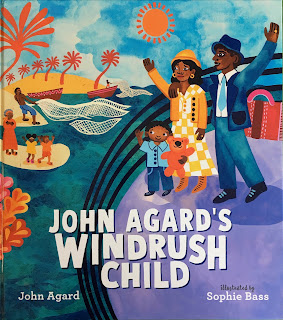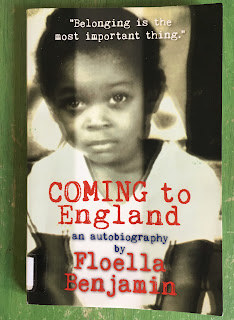Empire Windrush by Sophie Bass
On June 22 1948 almost 500 British citizens from the Caribbean disembarked from the Empire Windrush at Tilbury dock. They had travelled for 30 days to answer Britain’s call for help to rebuild the country after the Second World War. Between 1948 and 1971 many others from the Caribbean went on to help build the new NHS and work in public transport, manufacturing and construction, among other things. Many of those on the Windrush had served in the Allied forces during the war. Windrush Day celebrates the contribution of the Windrush Generation and their descendants in making Britain stronger and richer in many ways.
Black Cultural Archives
Difficult challenges faced the Windrush Generation when they arrived: hardship, separation from family and racism. Sometimes history reaches out into the present, and this happened in 2018 with the Windrush Scandal. A series of racist immigration laws passed over 30 years combined with the ‘hostile environment’ to lead to unjust arrests, detention and deportation of commonwealth citizens’ children who were wrongly classified as illegal immigrants. To learn more about this, and the experience of the Windrush Generation as children, I looked at three children’s books and visited the Black Cultural Archives in Windrush Square, Brixton, where there is a timeline of the history of Black people in Britain from the Romans until the present.
John Agard's Windrush Child illustrated by Sophie Bass
John Agard’s beautiful picture book, luminously illustrated by Sophie Bass, begins with a child’s footprints in the sand and ends with footprints in the snow. It captures the journey to Britain through the eyes of a little boy. His beloved teddy goes with him, but not his beloved Grandmother, who he carries with him in memory, photos and letters while he is ‘stepping into history’. The words and illustrations work seamlessly to convey his homesickness, adventure and hope. The book ends with ‘a mind-opening meeting of snow and sun.’
Coming To England by Floella Benjamin
Floella Benjamin’s autobiographical book ‘Coming To England’ spends the first half of the book in Trinidad, and vividly captures the food, flowers, holidays and fun of family life through a small girl’s eyes. But when her parents leave to work in Britain, the children have to go to different relatives until there is enough money for them to follow their parents. When they finally leave for England, as unaccompanied children on the ship, they are full of excitement. They have spent years in school learning about Britain, the ‘Motherland’. So it is a very big shock to encounter unfriendly, even hostile people once they arrive. The freezing winters, poor housing and absence of blue sky are hard to get used to. But family remains a source of strength. In the Afterword Floella Benjamin writes: ‘I hope this book will go some way in helping people to find their identity, to discover where they come from, to gain self respect and feel proud of themselves.’
Windrush Child by Benjamin Zephaniah
Benjamin Zephaniah’s Windrush Child is a moving historical novel for young people. It’s the story of Leonard, who at 10 years old leaves Jamaica with his mum to join his dad in England. They travel on Leonard’s mum’s British passport because in 1958 they are both British citizens. Life is not easy in the one room they live in. Leonard encounters bullying and prejudice and misses his grandma back in Jamaica. He makes friends with two Irish children who live downstairs but he and his dad face hostility and racist violence. Leonard grows up to make a home and a life for himself and his family. I don’t want to give away the story, so here is what Benjamin Zephaniah says in his Author’s Note: ‘Now I use my words to give voice to people like Leonard, the main character of this book. He’s just doing what people have been doing for thousands of years, moving around the planet. When people move they always have to deal with the trauma of leaving the country of their birth, and then the struggle to fit into their new home.’
Bookshop at Black Cultural Archives, Windrush Square, Brixton
I’d like to end with some words by John Agard at the back of his Windrush Child. Talking about the hardships facing the Windrush Generation after their arrival in Britain, he writes: ‘But despite many challenges, including racism, they went on to build strong communities: friends were made, stories shared and unfairness challenged. Caribbean culture had a powerful and positive impact on British culture, and Britain is a much better place because of the Windrush Generation.’
Windrush by Mike Phillips and Trevor Phillips
Moving from one country to another is a very big thing – perhaps you have experienced it yourself. All of the books we looked at focussed on the home left behind, maybe forever. Think of the front door to the first home you can remember. Imagine yourself standing in front of it with your bags and suitcases, having closed it for the last time. Describe the door and the doorstep, the path, road or pavement. What is the weather like? What noises can you hear – birds, traffic, sea? What smells are around you – flowers, fumes, cooking? What is the weather like? If you knew you would never return, what would you miss most about this home?
Further reading:
The Windrush Scandal: https://www.bbc.co.uk/news/uk-43782241
Benjamin Zephaniah talks about Windrush Child: Benjamin Zephaniah on new book Windrush Child: 'We have to learn from the past'
David Olusoga’s film The Unwanted – The Secret Windrush Files (TV special 2019) on BBC iplayer
Windrush by Mike Phillips and Trevor Phillips








